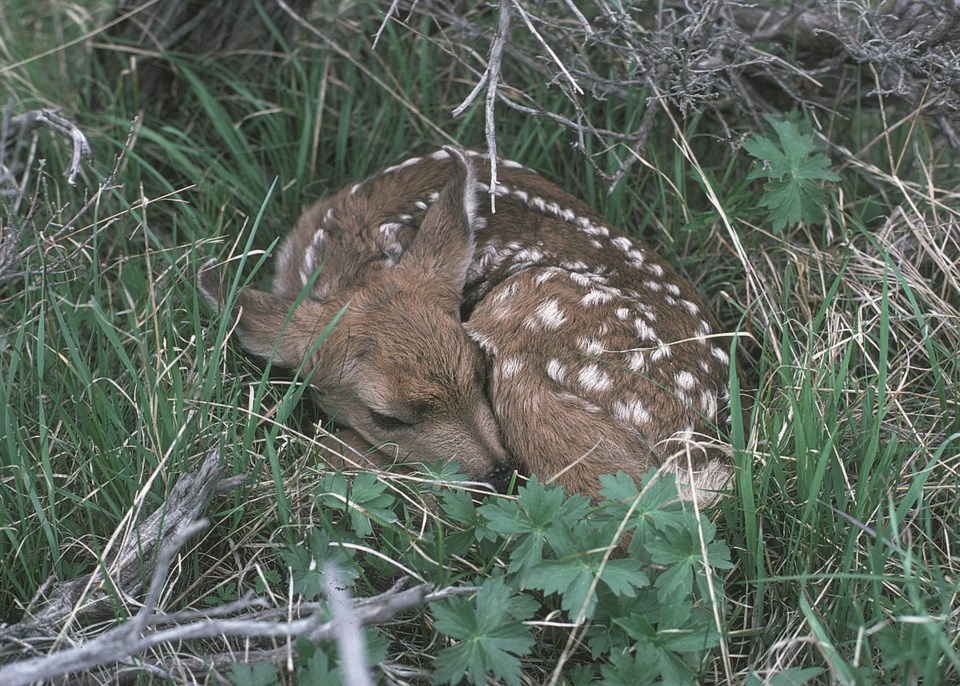Outdoor enthusiasts are likely excited that spring has now sprung, but the provincial government is reminding nature lovers not to touch or feed young wildlife when they encounter such animals.
Physical distancing is not just for humans but also applies to ducklings, rabbits, songbirds, or fawns. Such creatures should not be touched or fed when found in the wild or the city, the Ministry of Environment’s Val Nicholson said in a news release.
Attempting to help wild animals that appear orphaned or lost is detrimental to their health and safety, she explained. In nature, mothers purposely place their young into seclusion to protect them from predators. In most cases, these young creatures have not been abandoned or deserted since the mother is watching nearby.
“The chances for survival decrease significantly when young animals come into contact with humans. The best thing to do is to leave them alone and enjoy the animals from a distance,” said Nicholson.
Humans should only pick up young wildlife if the parent is found dead nearby or an unnatural situation occurs, such as a young songbird found on a doorstep. In that case, the bird should be moved to the closest suitable habitat.
Only wildlife rehabilitators are licensed to care for orphaned or injured animals since they are trained to give appropriate care and nutrition to improve the chances of survival, Nicholson said. If there are signs of injury or abandonment, residents should call 1-800-567-4224 or email [email protected].
Ducks and geese are some animals that well-meaning residents should not feed, especially if the birds are encountered in Crescent Park or Wakamow Valley. Bread can pollute the water and sicken the animals; instead, it’s OK to give the animals sliced seedless grapes, cooked rice, birdseed, peas, corn, oats, duck feed, or chopped lettuce.
Outdoor lovers are also reminded to steer clear of adult wildlife, such as deer or moose that wander into urban areas. Large crowds can stress the animal, leading to dangerous situations.
“Remember, give wildlife its space,” Nicholson added.
One organization that supports wildlife is the Wildlife Rehabilitation Society of Saskatchewan (WRSS), which has information about what to do when coming across a distressed animal, such as a wobbly fawn or a grounded hawk.
The number one rule in rescuing distressed wild animals is to ensure they are in distress. Rule No. 2 is to be careful when approaching a wild animal for safety’s sake. The third rule is to leave baby bunnies, in particular, where they are found.
Rabbits return to their babies early in the morning or late at night to avoid exposing them. Removing bunnies from their den can dissuade the mother from returning, so rehabilitation volunteers will often say to “put the bunny back.”
Fledgling birds are also often left on the ground for up to two weeks to teach them how to fly. If a nestling — a baby bird with bald patches and cannot stand or grip your finger as a perch — is found on the ground, that is cause for intervention.
Nestlings should always be returned to their nest, if possible, as long as the parents return eventually. If not, they should be kept warm, turned over to a rehabilitation centre, and never fed — a bird’s diet is complex and feeding them could be harmful.
“Never give food or water to a baby bird,” the WRSS said. “Many birds have specific food requirements, and feeding them the wrong thing may cause severe side effects or even death.”
Moose Jaw’s non-profit Wild & Cared Free Wildlife Rehabilitation Centre can be contacted through Facebook with concerns about injured or abandoned animals. Emergencies can warrant a phone call to the Moose Jaw Animal Clinic during regular hours at 306-692-3622.




